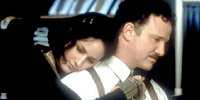
 |
My First Mister (2001) Directed by Christine Lahti Cast: Leelee Sobieski, Albert Brooks, Carol Kane, Desmond Harrington, Mary Kay Place, Michael McKean, John Goodman, Lisa Jane Persky 2001 – 109 minutes Rated: Reviewed by Dustin Putman, October 13, 2001.  The directorial debut of actress Christine Lahti (1995's "Hideaway"), "My First Mister" features such a strongly developed and endearing first half that it comes as somewhat of a major disappointment when the entire project derails into a weepy, TV-movie-of-the-week melodrama. Featuring revelatory performances from Leelee Sobieski (her third feature in a month, after "The Glass House" and "Joy Ride") and Albert Brooks (1999's "The Muse"), the film creates two characters we grow to care about and then somehow transports them into a soppy, unfinished screenplay by the final hour. It's a shame, too, because the picture had a lot going for it up until that point.
The directorial debut of actress Christine Lahti (1995's "Hideaway"), "My First Mister" features such a strongly developed and endearing first half that it comes as somewhat of a major disappointment when the entire project derails into a weepy, TV-movie-of-the-week melodrama. Featuring revelatory performances from Leelee Sobieski (her third feature in a month, after "The Glass House" and "Joy Ride") and Albert Brooks (1999's "The Muse"), the film creates two characters we grow to care about and then somehow transports them into a soppy, unfinished screenplay by the final hour. It's a shame, too, because the picture had a lot going for it up until that point.
Jennifer (Leelee Sobieski), who likes to be called "J," is a severely unhappy 17-year-old who dresses like a Goth, complete with an all-black wardrobe, innumerable piercings on her face, and a habit of self-mutilating her arms. Just having graduated from high school, she spends her time writing poetry and eulogies (her own), and longs to get out of the house of her Betty Crocker-wannabe mother (Carol Kane) and dense stepfather (Michael McKean).  While at the mall looking for a job, she spots a man working at a men's clothing store and is allured by him. His name is Randall (Albert Brooks), he's 49, and out of either mild attraction or pity, he hires J to be a stocking clerk in the back. Randall and J don't outwardly appear to have anything in common, but they gradually discover they are exactly alike: lonely, scared, and unsure of where they stand in life. They form a special bond with each other, becoming close friends, and have thoughts of maybe taking it a little further.
While at the mall looking for a job, she spots a man working at a men's clothing store and is allured by him. His name is Randall (Albert Brooks), he's 49, and out of either mild attraction or pity, he hires J to be a stocking clerk in the back. Randall and J don't outwardly appear to have anything in common, but they gradually discover they are exactly alike: lonely, scared, and unsure of where they stand in life. They form a special bond with each other, becoming close friends, and have thoughts of maybe taking it a little further.
It is at this point that "My First Mister" stops being about a relationship between two fascinating outsiders, and forces in an out-of-the-blue twist that feels as if it has come from another movie altogether. Replacing its natural, lightly comical and sad tone with creaky plot machinations and cluttered subplots, the film becomes little more than a chance to work the actors' (and the audience's) tear ducts. Discredit director Lahti and screenwriter Jill Franklyn for this calamitous pitfall; they both should have known better.  What does manage to shine through are the lovely performances from nearly the whole cast. Leelee Sobieski has been working overtime lately, and out of her three pictures that have been released this year, this one holds her standout performance (the other two were excellent, as well) and, coincidentally, is the weakest of the trio. Usually cast as the nice, blonde-haired good girl, Sobieski's appearance and acting style is so radically different in "My First Mister" that it rarely feels as if we're watching her at all. She effortlessly paints J as a complex, sometime difficult individual whom we may not always understand, yet can't help but learn to love. Albert Brooks is every bit her match, and while he does fit in his usual barbed, funny comments, his character of Randall is far more subdued and true-to-life than his previous work.
What does manage to shine through are the lovely performances from nearly the whole cast. Leelee Sobieski has been working overtime lately, and out of her three pictures that have been released this year, this one holds her standout performance (the other two were excellent, as well) and, coincidentally, is the weakest of the trio. Usually cast as the nice, blonde-haired good girl, Sobieski's appearance and acting style is so radically different in "My First Mister" that it rarely feels as if we're watching her at all. She effortlessly paints J as a complex, sometime difficult individual whom we may not always understand, yet can't help but learn to love. Albert Brooks is every bit her match, and while he does fit in his usual barbed, funny comments, his character of Randall is far more subdued and true-to-life than his previous work.
In her meatiest role in years, the underrated Carol Kane (1999's "Jawbreaker") does strong, touching work as J's mother, a woman who masks her own feelings of doubt with cooking, cleaning, and a nonstop rosy attitude. Meanwhile, Mary Kay Place (1999's "Girl, Interrupted") makes an unpredictable impression as a friendly nurse. Rounding out the cast, John Goodman (2001's "One Night at McCool's") plays J's hippie-stoner father; Michael McKean (2000's "Little Nicky") is J's stepfather; and Desmond Harrington (1999's "The Messenger: The Story of Joan of Arc") is Randy, a young man around J's age that enters into the proceedings near the end.  Aside from a reconciliation scene between J and her mom, and another set at a dinner table, "My First Mister" goes so wrong so quickly that the change is jarring. The incisive relationship formed between J and Randall loses its impact, and scene after scene suddenly rings with an unshakable falseness. At 109 minutes, "My First Mister" feels much longer, and doesn't know when to quit. The outcome of the film is unfortunate; so much promise was held, but the plot cruelly pulls the rug out from under the hardworking actors.
Aside from a reconciliation scene between J and her mom, and another set at a dinner table, "My First Mister" goes so wrong so quickly that the change is jarring. The incisive relationship formed between J and Randall loses its impact, and scene after scene suddenly rings with an unshakable falseness. At 109 minutes, "My First Mister" feels much longer, and doesn't know when to quit. The outcome of the film is unfortunate; so much promise was held, but the plot cruelly pulls the rug out from under the hardworking actors.
©2001 by Dustin Putman |
 |













